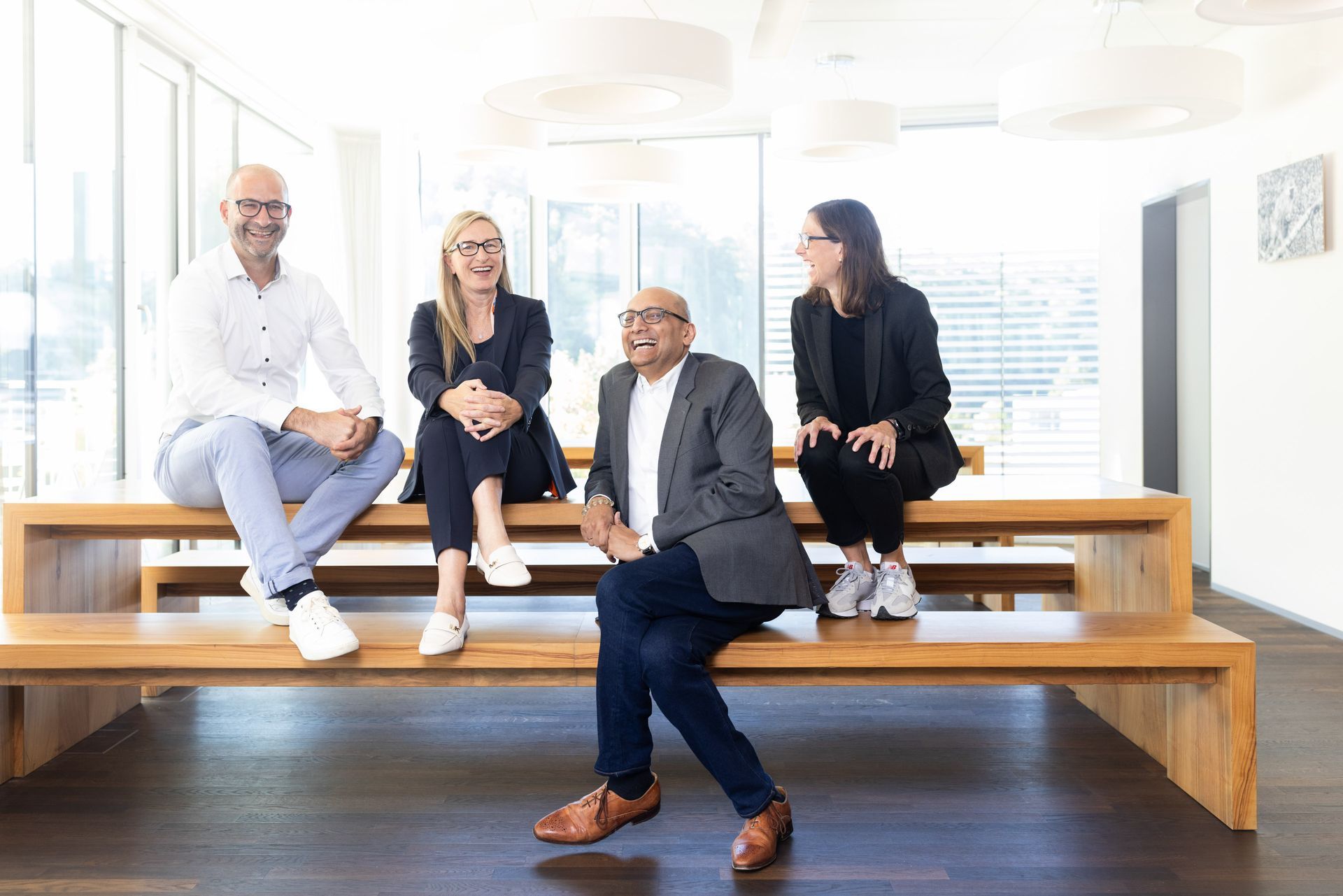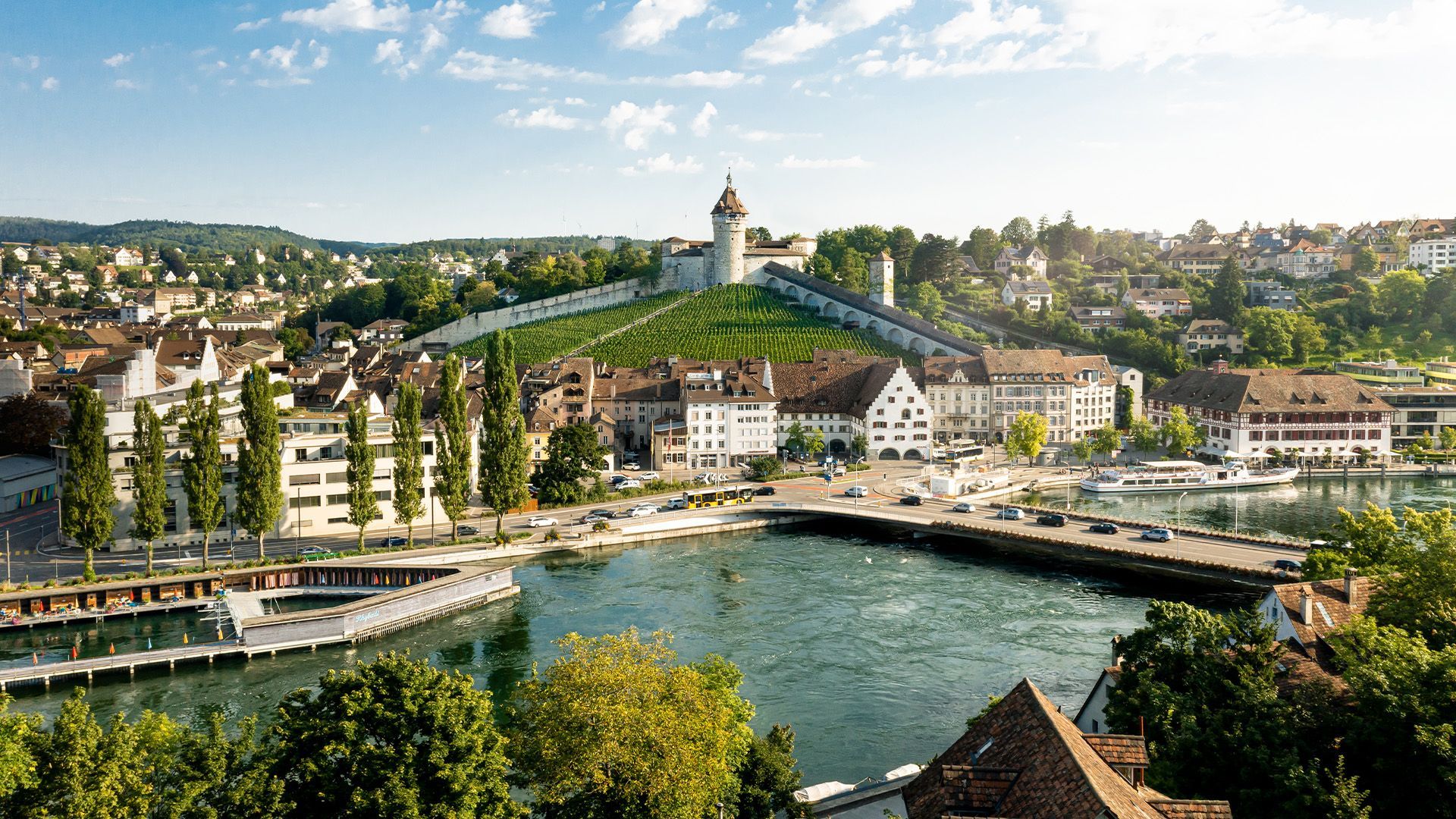Applied research in sustainability robotics
Schaffhausen is becoming a bridge between research and industry in sustainability robotics. As an "application region," drones and intelligent machines will be developed and tested under real-life conditions. These new innovations are focused on sustainability applications: investigating and monitoring our environment.
The drone buzzes in the air, then suddenly disappears into the waters of the Rhine. Has it crashed? No... the woman wearing 3D glasses is still calmly moving the controls. Suddenly, the drone reappears above the surface with a water sample and lands gently on the shore.
Tests like this are still a vision for the future. But, as Professor Mirko Kovač sees it, they'll soon become part of everyday life. Kovač is head of the Laboratory for Sustainability Robotics at Empa in Dübendorf and at EPFL, and one of the leading figures in the emerging field of sustainability robotics. This discipline applies physical AI to develop new types of robots and enable new applications that provide support in maintaining and improving infrastructure or protecting the environment.
One of Kovač's objectives is for Switzerland to take a leading position in sustainability robotics, with Schaffhausen playing a key role. To this end, Empa has concrete plans to establish a center of excellence for sustainability robotics in Schaffhausen, as an extension of its own testing infrastructure at the DroneHub and AeroAquaArena in Dübendorf.
Why in Schaffhausen?
Global challenges, like the COVID crisis, energy insecurity, the OECD minimum taxation policies, and geopolitical tensions put pressure on Schaffhausen as a business location. Export-oriented industries in particular face constant pressure to strengthen their innovative capabilities. To help support the regional economy, the canton of Schaffhausen is focusing on developing our regional innovation ecosystem, positioning Schaffhausen as an "application region" for future-oriented technologies.
An application region is a space for innovation, where new technologies are not only researched, but tested and further developed under real-world conditions. An application region forms the bridge between basic research and market-ready products. Prototypes are validated, experience in the field is gathered, and solutions are developed for specific areas of application in business and society. All this involves close cooperation between industry and research institutions, and with support from the public sector and economic development agency.
Schaffhausen has already made its mark as an innovation region, with projects like the Swiss Transit Lab, drone testing on the Schmerlat Airfield, and the AGROSCOPE test center for smart technology in agriculture. The center of excellence in sustainability robotics builds on this experience, with Empa serving as the partner in basic research and successful technology companies with materials and manufacturing expertise on site. These conditions make Schaffhausen an ideal location for bringing future technologies from the laboratory into practice - and strengthening our regional innovation ecosystem.

With its unique biodiversity, strong regional economy and pool of high-tech companies, and supportive local government, Empa considers Schaffhausen an ideal place for establishing its center of excellence.
AbbVie
Center of Excellence in Sustainability Robotics
Professor Kovač and his team of researchers are still testing the robots in the laboratories of Empa and EPFL. Their next step will be testing first steps or first flights for the robots in an outdoor laboratory at the DroneHub in Dübendorf. Kovač aims both to investigate the extent to which drones and other robots can take on tasks in building maintenance or repair that are too dangerous for humans, and to develop a diverse portfolio of robots and drones for collecting environmental data in forests and wetlands.
But this research is still taking place under controlled parameters. "What if the wind is stronger, or the current is different than we expected? Before we deploy our robots in extreme conditions in Greenland or in the urban canyons of large cities, we need to put them through their paces - first inside and then outside of the laboratory.
Establishing a center of excellence in sustainability robotics in Schaffhausen will enable Empa to transfer its research from the laboratory to real-world environments. With close cooperation with local industry, government, and educational institutions, Schaffhausen will become an application region for sustainability robotics and other technologies designed to provide long-term support for the environment and society.
"We find the best situation here: the internationally unique biodiversity with the Rhine and Randen, the strong economic location with its many high-tech companies, the short distances and the support from economic development agencies and authorities are exactly what we need to set up our center,“ explains Kovač. ”We have the conditions here to gain experience with our robots – whether they fly or move on land or in water. And at the same time, we can enter into partnerships with local businesses." These could be software manufacturers, injection molders, sensor developers, or development departments at local headquarters - all industries and structures available in Schaffhausen's regional business community. Initial discussions have taken place and will be further intensified in the coming months, and ideas have also been exchanged with the administration and local schools. These are the first seeds planted so that ideas and projects can grow.
Next steps
Empa and the Canton of Schaffhausen aim to work closely with Schaffhausen companies over the next five years to jointly develop and validate robotic solutions in the field of environmental sensor technology. The Center of Excellence in Sustainability Robotics will test and apply these solutions in real-world environments, for example, by monitoring water quality or measuring biodiversity.
To this end, locations in the canton of Schaffhausen will be equipped with sensor technology for conducting test applications. The Center of Excellence is intended to serve as an innovation and research hub in the field of sustainability robotics and enable knowledge transfer between research and local companies or organizations. And with its support for the Center of Excellence through the RSE framework, the Canton of Schaffhausen is making an important contribution to ensure that development and a feasibility study can proceed.
There is more
Schaffhausen newsletter
New to Schaffhausen or been here awhile? Stay up to date with our newsletter!







